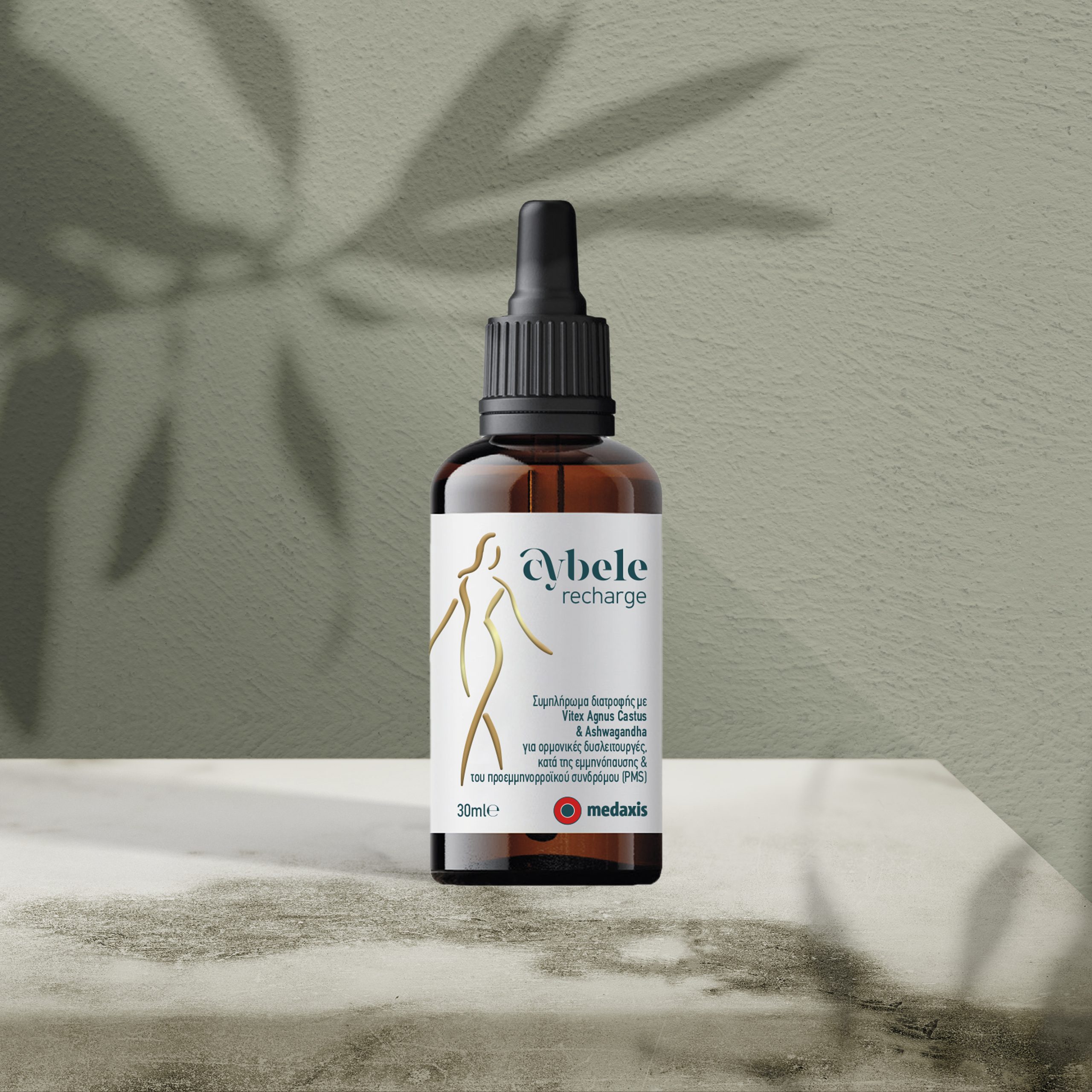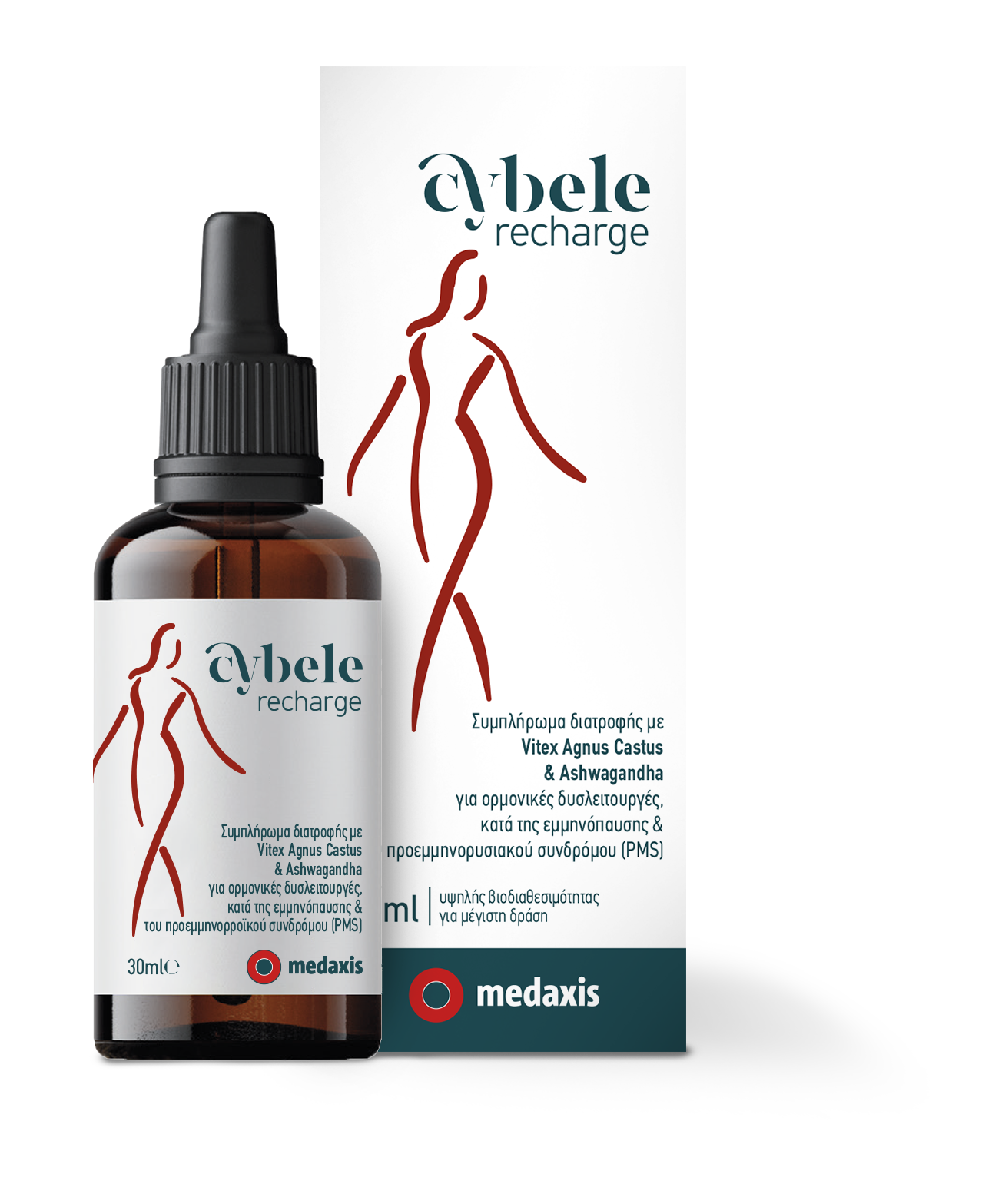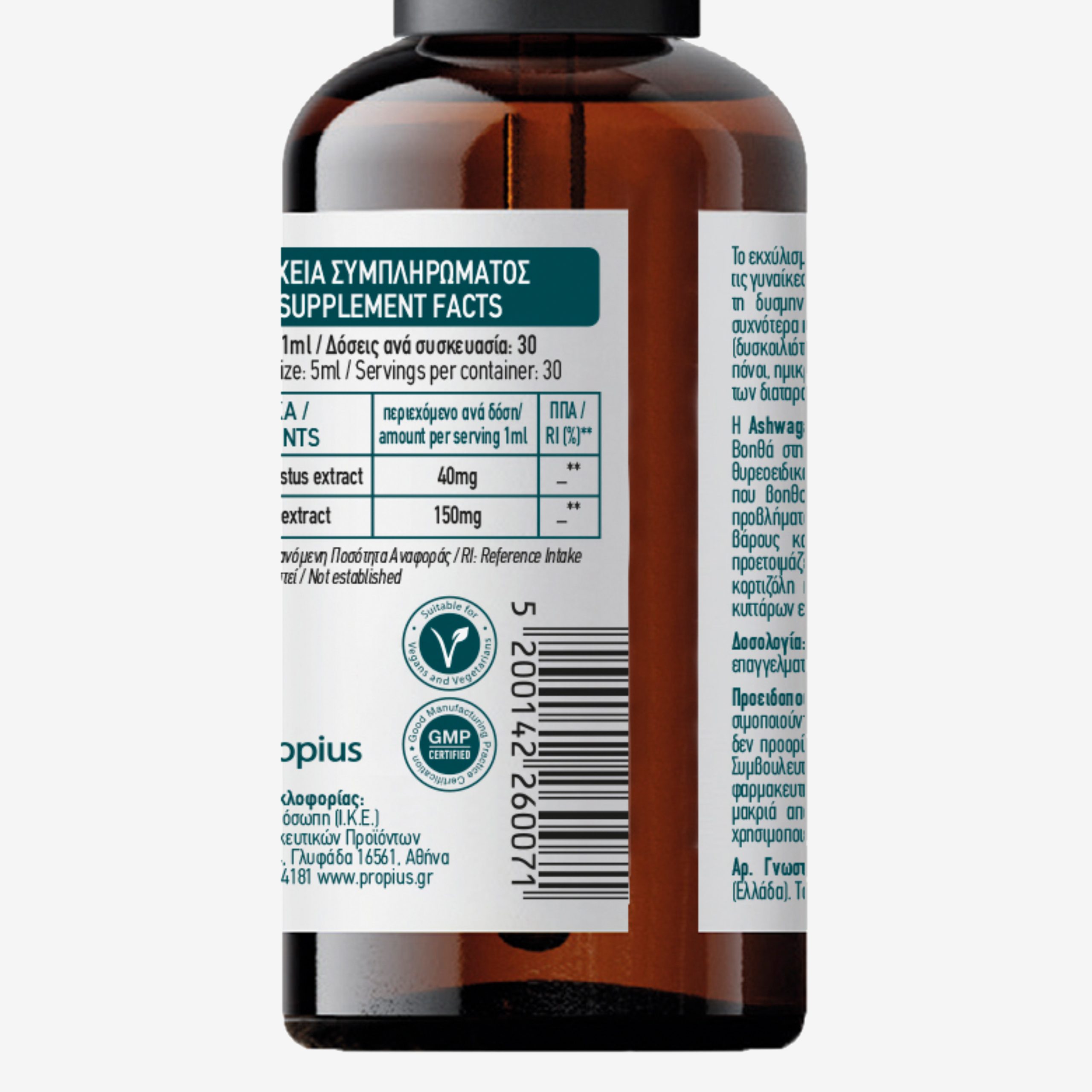Cybele Recharge
Indications
PMS (Pre-Menstrual Syndrome)
PMS is often a sign of hormone imbalance and oestrogen dominance. It refers to a variety of emotional, behavioral and physical symptoms that occur up to two weeks before the onset of menses. It is characterised by physical symptoms such as menstrual cramps, headaches, skin problems and breast tenderness; and emotional symptoms including irritability, mood swings depression and anxiety. It is estimated that as many as 30% of women can experience moderate to severe PMS and between 3 and 8 % of women suffer from premenstrual dysphoric disorder (PMDD), a severe form of PMS, which can have a significant impact on life. PMS symptoms have been linked with a low level of progesterone.
A clinical survey evaluated the effect of an Agnus Castus preparation on 1,542 women diagnosed with PMS. Treatment of 40 drops daily lasted an average of 166 days. Both physicians and patient assessed efficacy, with 90 percent reporting relief of symptoms, after an average treatment duration of 25.3 days.
In other clinical trials, Agnus Castus reduced many symptoms associated with PMS, especially breast pain, irritability, depression and low mood, irritability, and headache.
Amenorrhea and Menstrual Disorders
A healthy menstrual cycle depends on the proper balancing of hormone levels. Agnus Castus has been shown to correct menstrual irregularities, including amenorrhea (the absence of menstruation), specifically when caused by latent hyperprolactinemia (a condition in which a person has higher-than-normal levels of the hormone prolactin in the blood) owing to its ability to inhibit prolactin secretion.
Luteal phase disorder is primarily caused by progesterone deficiency in the first phase of the menstrual cycle. An RCT of women with luteal-phase defect menstrual cycle irregularities attributable to elevated prolactin found that 20 mg of Vitex lowered prolactin levels and normalized menstrual cycles after 3 months.
Menopause
The hormone-balancing effects of Agnus Castus may also help to alleviate the unpleasant symptoms of menopause. In one study, vitex oils were given to 23 women in menopause. Women reported improved menopause symptoms, including better mood and sleep.
Polycystic Ovarian Syndrome (PCOS)
PCOS is a complex endocrine disorder and is said to affect around 6-8% of the female population in the reproductive age. It is caused by an imbalance of the female sex hormones and higher levels of hormones called androgens (e.g., testosterone and androstenedione). It is characterised by polycystic ovaries, lack or absence of ovulation and excessive presence of the male sex hormones. This can lead to irregular menstrual cycles, hirsutism (excessive hair growth), skin problems and infertility. In conditions like PCOS, Agnus Castus is helpful in restoring ovulation and regulating progesterone levels.
Agnus Castus helps to regulate prolactin, FSH, and LH, which may then regulate and balance testosterone levels, as well as levels of other reproductive hormones. This can be therapeutic in women with PCOS and elevated androgens.
Contraindications
Agnus Castus should not be used by anyone undergoing infertility treatment and is also not recommended by anyone on birth control. It should not be used by pregnant and breastfeeding women. There are no reported drug interactions but given its dopaminergic effects, the herb could potentially interfere with drugs that affect dopamine levels.
Brown D. (1994) Vitex agnus castus clinical monograph. Quarterly Review of Natural Medicine. 2:111–21.
How does Ashwagandha help PMS?
Mood – Due to its regulating action on the HPA (hypothalamic-pituitary-adrenal) axis, ashwagandha regulates the level of cortisol (the stress hormone) in the body which helps to regulate moods and decreases the overall state of stress, anxiety and irritability. Chronic stress in day-to-day life leads to a higher level of cortisol production in the body which interferes with the production of progesterone and thyroid hormones. Progesterone and thyroid hormone disruption interferes with the menstrual cycle. Many women experience anxiety and irritability as part of their PMS symptoms due to the change in hormones. Regulating cortisol also has a positive effect on the regulation of other hormones including reproductive hormones which improves mood, anxiety, irritability during PMS and the normal rhythm of your monthly cycle.
Sleep – Sleep is often interrupted before menstruation begins and can be part of PMS. As hormones fluctuate, your body can become out of balance and does not produce the same level of sleep hormones. Broken and poor-quality sleep and worsen mood imbalances and trigger irritability. Ashwagandha has a calming effect on the body and decreases the level of cortisol, which then allows your body to make more of the sleep hormone melatonin, helping you to get to sleep and stay asleep. Studies have shown the benefits of ashwagandha on overall sleep quality.
Food cravings – Sweet food cravings are a common PMS symptom, and if you cave in and binge on sugary foods, you may make hormone imbalances worse. Decreasing the level of cortisol in the body with ashwagandha may improve sweet food cravings. The body typically craves sweet foods when cortisol levels are high as a prehistoric survival mechanism. Sugary foods increase the levels of inflammation in the body and increases pain. Sugar also triggers an increase in testosterone levels, leaving your whole hormonal cycle out of balance.
Ashwagandha: The Science Behind Its Benefits for Menopause
Research has shown that Ashwagandha can effectively reduce the symptoms of menopause. A study published in the Journal of Ayurveda and Integrative Medicine found that Ashwagandha helped reduce the frequency and intensity of hot flashes in menopausal women. Another study published in the Journal of Ethnopharmacology found that Ashwagandha helped reduce anxiety and improve mood in menopausal women.
In addition to reducing hot flashes, anxiety, and improving mood, Ashwagandha has also been found to improve cognitive function in menopausal women. A study published in the Journal of Dietary Supplements found that Ashwagandha supplementation improved memory, attention, and information processing speed in menopausal women. This is particularly important as cognitive decline is a common concern for women going through menopause.
How Ashwagandha Helps Manage Hot Flashes and Night Sweats
Hot flashes and night sweats are among the most commonly reported symptoms of menopause. These symptoms can be disruptive and affect a woman’s quality of life. Ashwagandha contains natural compounds that help regulate the body’s temperature and reduce the frequency and severity of hot flashes and night sweats. It also helps reduce inflammation and promote relaxation, which can further alleviate these symptoms.
In addition to managing hot flashes and night sweats, Ashwagandha has been found to have other health benefits. It has been shown to improve brain function and memory, reduce stress and anxiety, and boost immunity. Ashwagandha is also a natural adaptogen, which means it helps the body adapt to stress and maintain balance.
The Role of Ashwagandha in Improving Mood and Reducing Anxiety During Menopause
Many women experience mood swings and anxiety during menopause, which can be attributed to the hormonal changes taking place in the body. Ashwagandha has been shown to improve mood and reduce anxiety in menopausal women. This is because it helps regulate the levels of cortisol, the stress hormone, in the body, and promotes the production of serotonin, the feel-good hormone.
In addition to its mood-boosting and anxiety-reducing effects, Ashwagandha has also been found to have other benefits for menopausal women. It can help improve sleep quality, which is often disrupted during menopause, and reduce hot flashes and night sweats. Ashwagandha has also been shown to have anti-inflammatory properties, which can help alleviate joint pain and stiffness that some women experience during menopause.
https://www.allohealth.care/healthfeed/medicine



